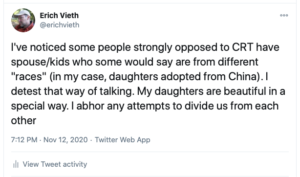Many of us grew up with and/or currently live with other people who look different than we do. I am of European ancestry and my two daughters were adopted from China. We look a bit different, but I think of them as fully and forever my two wonderful daughters, albeit with this footnote: our ancestors came from different parts of the planet and we were so incredibly lucky we have found each other. My daughters are now young adults. They are capable and beautiful women, unique in their looks, their personal character and their interests. Anyone taking even a tiny bit of time to get to know my daughters would quickly agree.
It recently occurred to me that many people would consider that my daughters are of a different “race” than me. That strange thought jumped as I was studying Critical Race Theory (CRT), which strongly advocates for an intensely racialized social landscape:
Critical race Theorists therefore advocate not being colorblind or meritocratic. Instead, they recommend that we all focus on race and racism specifically at all times and prioritize diversity, equity, and inclusion in hiring and other opportunities. In practice, this often means to run mandatory implicit bias tests and training in workplaces and ensure that more people of racial minorities are represented in any (prestigious) workplace that lacks them.
I refuse to think of my daughters as being of “another race.” In fact, this is a repulsive and divisive thought for me. All human beings have descended from various populations of one single species. Despite our common biological roots, each person is unique in a complex ways. No two people are alike and the only way to get to know any other person is to spend some quality time with them. Thinking of other humans as simple colors rather than as unique people prevents us from having meaningful relationships with each other.
Hence my Tweet:
Side note: I’m fully aware that the United States is filled with people who still think that superficial immutable physical traits are more than skin deep. I disagree. The concept of “race” is defective in the same way that astrology is defective. These two approaches for attempting to get to know other people fail. Both of these lazy approaches use irrelevant accidents as a false proxy for taking the time to get to know each other.
I try to avoid using the word “race” except in scare quotes because a) Use of the term “race” suggests that there is a benefit to seeing people as colors, b) The term “race” confuses people and needlessly divides us from each other, and c) fretting about “race” is always followed by destructive conduct: trying to judge the personal character of other people by the the way their bodies look is truly one of the most idiotic things people have ever done.
It also occurs to me that there might be a causal connection between my experience harmoniously living with people of “another race” and my forceful rejection of CRT. I suspect that my experience living in a “multi-racial” household has incentivized me to forcefully reject the poisonous and divisive ideology offered by Critical Race Theory. People cannot meaningfully be stuffed into a simplistic color categories. They can only be understood as individuals, one by one, and there are no shortcuts. I’ve learned this in many ways during my life, not just being a parent in a “mixed race” household. I’ve been extremely fortunate to have the opportunity to really get to know many people of different “races” during my life as a student, asa photographer, as a musician and as an attorney who has handled more than a few civil rights cases for plaintiffs.
I’ve also noticed that many prominent writers from “racially mixed” households have taken similar strong stands against Critical Race Theory (CRT). This includes John McWhorter, Thomas Chatterton Williams, Wilfred Reilly, Christopher Rufo, Shelby Steele, Barack Obama, Coleman Hughes and others. This makes me wonder whether those who have lived lives well-blended with people of other “races” can more easily see that sticking people in “racial” categories is a terrible way to get to know other people.
Contrast this with the fact that many Americans who are suspicious of other “races” have spent their entire lives segregated from those of other “races.” I’ve noticed that many of the shrill CRT advocates are “white” people who tend to run in homogenous packs of “white” people. Could it be that their willingness to embrace CRT flows from their segregated lives? Is it possible that many CRT people (such as Robin DiAngela) have been damaged by their failure to really get to know people of other “races”? It would take a high degree of ignorance, or perhaps fear or laziness (again, I’m thinking of Robin DiAngelo), to categorize complex individuals who come in many shapes, colors, skillsets, histories and personal characteristics (including the Big Five personality traits) and levels of accomplishments into silos that are simplistically labeled “white” and “Black.”
It is my operating assumption that people will not willingly categorize each other into color categories if they spent quality time with those of other “races.” People who have made close relationships with people of other “races” have essentially essentially given themselves a vaccine to protect them from getting caught up in CRT.
Consider this quote by Miguel de Unamuno:
“Fascism is cured by reading, and racism is cured by traveling.”
Similarly, racism is cured by “traveling” through life having close relationships with those of other “races.”
I am interested to know whether any social scientists have studied what I am describing. My observation, once again, is that people who have close and enduring relationships with those of other “races” are far more likely to be repulsed by CRT.
[Edit note 2020.11.13: I posted a much simpler version of this post yesterday. I expanded on this idea as I considered it further].


